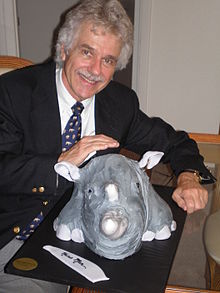- Mark L. Knapp
-
Mark L. Knapp
Mark Knapp with rhino cakeOccupation Professor Mark L. Knapp (born July 12, 1938) is the Jesse H. Jones Centennial Professor Emeritus and a Distinguished Teaching Professor Emeritus at the University of Texas at Austin. He is internationally known for his research and writing on nonverbal communication and communication in developing relationships. He has also done research and published books on lying and deception in human interaction.
Knapp served in the United States Army in Germany from 1957 to 1959, received his bachelor’s (1962) and master’s (1963) degrees from the University of Kansas and his PhD (1966) from Pennsylvania State University. He was employed at the University of Wisconsin–Milwaukee (1965–1970); Purdue University (1970–1980); the State University of New York at New Paltz (1980–1983); the University of Vermont (1983); and the University of Texas at Austin (1983–2008).
He was the editor of Human Communication Research (1980–83); an Eastern Communication Association Scholar (1982-3); a Fellow in the International Communication Association (1980); and a Distinguished Scholar in the National Communication Association (1993). The Mark L. Knapp Award for career contributions to the study of interpersonal communication is awarded annually by the National Communication Association.
Knapp received teaching awards from the Central States Speech Association (1969), the University of Wisconsin-Milwaukee (1969), Purdue University (1974), SUNY-New Paltz (1983), the University of Texas (1987, 1993, 1999, 2002) and the National Communication Association (2004).
He was the President of the International Communication Association (1975–76), the National Communication Association (1989–90), the Association for Communication Administrators (1996–97) and the University of Texas chapter of the honor society of Phi Kappa Phi (2001–2003). He was the Chair of the Department of Speech Communication at the University of Texas (1989–1996) & the Department of Communication Studies (2000–2001).
Knapp examined a wide variety of topics in his published research, including: conversational narcissism, behaviors enacted in greetings, goodbyes, and conversational turn-taking, memorable messages, regrettable messages, messages people attach to their email signatures, compliments, play behavior, the construct of intent, anti-drug abuse commercials, communication in developing relationships, nonverbal and deceptive behavior in close relationships, communicating commitment in close relationships, couples’ personal idioms, the effects of interaction on appearance, nonverbal communication and aging, communicating with the terminally ill, staff-resident communication in nursing homes, and the measurement of conflict in organizations.
He has lectured to, trained, and/or acted as consultant to over 60 different business organizations, voluntary groups, government agencies, & educational institutions—including IBM, U.S. Peace Corps, Pfizer Drug and the Texas Attorney General's Office.
Books
- McCroskey, J.C., Larson, C. E., & Knapp, M. L. (1971). An introduction to interpersonal communication. Englewood Cliffs, N.J.: Prentice Hall.
- Knapp, M. L. (1972; 1978). Nonverbal communication in human interaction. NY: Holt, Rinehart & Winston. Editions with Hall, J. A. in 1992, 1997, 2002, 2006, & 2010. Translated into Portuguese, Chinese, Russian, Polish, Japanese, and Spanish.
- Knapp, M. L. (1978). Social intercourse: From greeting to goodbye. Boston: Allyn & Bacon.
- Knapp, M. L. (1980). Essentials of nonverbal communication. NY: Holt, Rinehart, & Winston. Translated into Spanish.
- Knapp, M. L. (1984). Interpersonal communication and human relationships. Boston: Allyn & Bacon. Editions with Vangelisti, A. L. in 1992, 1996, 2000, 2005, 2009.
- Knapp, M. L. & Miller, G. R. (Eds.) (1985; 1994). Handbook of interpersonal communication. Beverly Hills: Sage. Edition with Daly, J. A. replacing Miller in 2002.
- Knapp, M. L. (2008). Lying and deception in human interaction. Boston: Pearson/Allyn & Bacon.
- McGlone, M. S. & Knapp, M. L. (Eds.) (2009). The interplay of truth and deception: New agendas in theory and research. NY: Routledge.
- Knapp, M. L. & Daly, J. A. (2010). Interpersonal communication. 4 vols., Sage benchmarks in communication. London: Sag
External links
Categories:- Pennsylvania State University alumni
- Living people
- 1938 births
Wikimedia Foundation. 2010.

